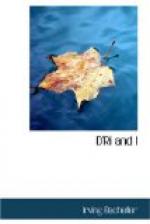XIX
D’ri and I left the chateau that afternoon, putting up in the red tavern at Morristown about dusk.
My companion rode away proudly, the medal dangling at his waistcoat lapel.
“Jerushy Jane!” said he, presently, as he pulled rein. “Ain’t a-goin’ t’ hev thet floppin’ there so—meks me feel luk a bird. Don’t seem nohow nat’ral. Wha’ d’ ye s’pose he gin me thet air thing fer?”
He was putting it away carefully in his wallet.
“As a token of respect for your bravery,” said I.
His laughter roared in the still woods, making my horse lift and snort a little. It was never an easy job to break any horse to D’ri’s laughter.
“It’s reedic’lous,” said he, thoughtfully, in a moment.
“Why?”
“‘Cause fer the reason why they don’t no man deserve nuthin’ fer doin’ what he ’d orter,” he answered, with a serious and determined look.
“You did well,” said I, “and deserve anything you can get.”
“Done my damdest!” said he. “But I did n’t do nuthin’ but git licked. Got shot an’ tore an’ slammed all over thet air deck, an’ could n’t do no harm t’ nobody. Jes luk a boss tied ’n the stall, an’ a lot o’ men whalin’ ‘im, an’ a lot more tryin’ t’ scare ‘im t’ death.”
“Wha’ d’ ye s’pose thet air thing’s made uv?” he inquired after a little silence.
“Silver,” said I.
“Pure silver?”
“Undoubtedly,” was my answer.
“Judas Priest!” said he, taking out his wallet again, to look at the trophy. “Thet air mus’ be wuth suthin’.”
“More than a year’s salary,” said I.
He looked up at me with a sharp whistle of surprise.
“Ain’ no great hand fer sech flummydiddles,” said he, as he put the medal away.
“It’s a badge of honor,” said I. “It shows you ’re a brave man.”
“Got ’nough on ’em,” said D’ri. “This ’ere rip ’n the forehead’s ’bout all the badge I need.”
“It’s from the emperor—the great Napoleon,” I said. “It’s a mark of his pleasure.”
“Wall, by Judas Priest!” said D’ri, “I would n’t jump over a stump over a stun wall t’ please no emp’ror, an’ I would n’t cut off my leetle finger fer a hull bushel basket o’ them air. I hain’t a-fightin’ fer no honor.”
“What then?” said I.
His face turned very sober. He pursed his lips, and spat across the ditch; then he gave his mouth a wipe, and glanced thoughtfully at the sky.
“Fer liberty,” said he, with decision. “Same thing my father died fer.”
Not to this day have I forgotten it, the answer of old D’ri, or the look of him as he spoke. I was only a reckless youth fighting for the love of peril and adventure, and with too little thought of the high purposes of my country. The causes of the war were familiar to me; that proclamation of Mr. Madison had been discussed freely in our home, and I had felt some share in the indignation of D’ri and my father. This feeling had not been allayed by the bloody scenes in which I had had a part. Now I began to feel the great passion of the people, and was put to shame for a moment.




